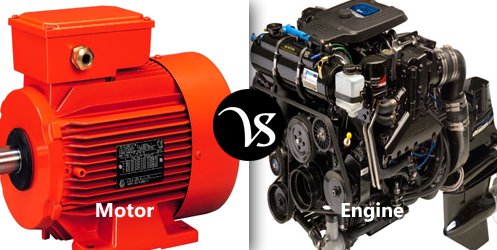 Motor:
Motor:
A motor is a device that creates motion. In simple terms, a motor is a device which converts mechanical energy into electrical energy. Motor is generally used to refer to a rotating device such as an electric motor. Motor needs electricity to work or operate.
Engine:
An engine is a machine which converts energy into useful mechanical motion. Engine is a mechanical device which converts force or heat energy into motion. Fuel is required for an engine to work. The word engine refers to a reciprocating engine (stem or internal combustion).
Differences:
| Basis | Motor | Engine |
|---|---|---|
| Definition (www.oxforddictionaries.com) | A machine, especially one powered by electricity or internal combustion, that supplies motive power for a vehicle or for another device with moving parts | A machine with moving parts that converts power into motion |
| Synonyms | Turbine, transformer, generator, cylinder and mechanism | Weapon, appliance, instrument, diesel and tool |
| Antonyms | Noncausal, afferent, noncausative | |
| Types | Its types are:
|
Its types are:
|
| History | In the year 1886, the first electrical motor was invented by scientist Frank Julian Sprague. That was capable of rotating at a constant speed under a varied range of load, and thus derived motoring action. | Simple machines, such as the club and oar (examples of the lever), are prehistoric. More complex engines using human power, animal power, water power, wind power and even steam power date back to antiquity. Human power was focused by the use of simple engines, such as the capstan, windlass or treadmill, and with ropes, pulleys, and block and tackle arrangements; this power was transmitted usually with the forces multiplied and the speed reduced. |
| Word origin | It was originated from the Late Middle English (denoting a person who imparts motion): from Latin, literally ‘mover’, based on movere ‘to move’. | It was originated from the Middle English (formerly also as ingine): from Old French engin, from Latin ingenium ‘talent, device’, from in- ‘in’ + gignere ‘beget’; compare with ingenious. |
| Works with | Motor works with electricity. | Engine works with fuels. |
| Pronunciation | Eng (UK): /ˈməʊtə/ Eng (US): /ˈmōdər/ |
Eng (UK): /ˈɛndʒɪn/ Eng (US): /ˈenjən/ |
| Main function | The main function of the motor is to convert electricity into motion. | The function of engine are:
|
| Made up of | Motor is made up of rotors and stators. | An engine is made up of pistons and cylinders. |
| Energy uses | Motor provides energy using various forms. | Engine uses energy in required form. |
| Converts | Motor converts the mechanical energy in hydraulic energy. | Engine uses energy in required form. |
| Advantages/Benefits | Its advantages are:
|
Its advantages are:
|
| Disadvantages | Its disadvantages are:
|
Its disadvantages are:
|
| Example in Sentence |
|
|





